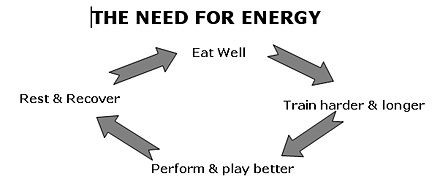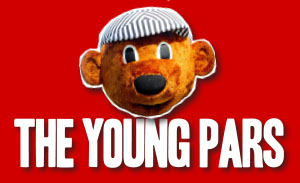DAFC Nutrition & Hydration Information
Monday, 21st Feb 2011Diet significantly influences performance. An adequate diet, in terms of quantity and quality, before, during and after the game and training, will maximise performance. All the essential nutrients below are contained in the foods that make up a balanced diet:

Advice for players and parents
THE BENEFITS OF EATING WELL
What do these footballers have in common?
Wayne Rooney
Lionel Messi
Cristiano Ronaldo
Cesc Fabregas
Steven Gerrard
By eating the right foods for training and playing football they can:
?Train longer and harder
?Perform longer in games at a higher level
?Delay fatigue
?Help their bodies recover faster after playing and training
?Reduce the risk of injury
Are you ambitious?
Do you really want to do everything in your power to become a better footballer?

Have you ever stopped and thought carefully about what you eat?
What a footballer eats can and does make a difference to performance.
Food gives you energy - Footballers need high levels of energy.
DIET
Diet significantly influences performance. An adequate diet, in terms of quantity and quality, before, during and after the game and training, will maximise performance. All the essential nutrients below are contained in the foods that make up a balanced diet:
?Carbohydrates
?Protein
?Fats
?Vitamins
?Minerals
?Fibre
?Water
WHAT IS A BALANCED DIET?
Foods from four main groups
Variety of foods
Provides essential nutrients
Most foods relative proportions
Carbohydrates, fats and proteins
A BALANCED DIET - 4 MAIN GROUPS
GROUP 1
Cereal and starchy vegetables (bread, rice, pasta, potatoes etc)
Provides energy, fibre, protein, vitamins, and minerals. Little fat
GROUP 2
Fruit and vegetables (fresh, raw and cooked - all types)
Provides vitamins C and A, calcium and iron. Little fat
GROUP 3
Meat (meat, poultry, fish, eggs, nuts)
Provides protein, vitamins, minerals, energy, fibre and fat.
GROUP 4
Milk and milk products (milk, cheese, yoghurts)
Provides protein, some vitamins, energy, fat and calcium.
OTHER GROUPS
Sugar, sugary foods and drinks (cakes, chocolates etc)
Fats and oils (salad cream, butter etc)
WHAT DO WE NEED DAILY?
Cereals and starchy vegetables - 5 to 11 portions
Fruit and vegetables - 5 + portions
Milk, dairy produce, meat and fish - 2 to 3 portions
Oils and fats - 0 to 3 portions
DIET PROPORTION FOR YOUNG ATHLETES
55-65% Carbohydrates
10-15% Protein
20-30% Fat
Focus on Carbohydrates and Fat
Emphasise balanced diet
Avoid supplements
WHAT ARE CARBOHYDRATES?
Carbohydrates are broken into two different food types:
1. SUGARY
Biscuits, Cakes, Sweets, Soft drinks, Honey, Yoghurts, Fruits (oranges, grapes)
2. STARCHY
Bread, Rice, Pasta, Potatoes, Cereals, Beans, Peas, Lentils
Try to include more Starchy foods (less fat)
Starchy carbohydrates take longer to digest
Refuel quickly after you stop
A good diet for a footballer is seven meals per day, based around Carbohydrates and low in fat.
Seven Meals a Day! (Example)
BREAKFAST
Cereal / Toast / Orange Juice(Skimmed milk)
MID MORNING
Banana / Digestive Biscuit / Drink
LUNCH
Ham Roll / Low Fat Yogurt / Crisps / Fruit / Drink
MID AFTERNOON
Mars Bar / Scone / Malt Loaf
DINNER
Jacket Potato / Lasagne / Vegetables / Jelly
SUPPER
Cereal / Biscuit
DRINK
Throughout the day (Water Bottle)
HYDRATION
All professional footballers, know how important it is to keep hydrated.
Hydration is a measure of how much water you have in your body. Water is one of the most important nutrients in your diet. You can survive for only a fedays without water, although you can live for weeks without food.
Drinking too little water or losing too much water through sweating will have a negative effect on your performance in training and matches. Effects on performance will mean that you:
?Run slower
?Don't cover as much distance
?React to the ball slower when tackling / passing / intercepting / saving
?Can't jump as high to head or gather / clear the ball for goalkeepers
Exercise increases the production of heat from your body, and sweating helps you to lose this heat, keeping you cool and preventing you from overheating. However, it's important to replace these sweat losses otherwise you will become dehydrated.
If you do become dehydrated, your body temperature rises, performance suffers and at the extreme you could suffer heat stress. The simplest way to tell if you are adequately replacing sweat losses is to check the colour and quantity of your urine.
If your urine is very dark you need to drink more fluids. When your urine is pale yellow your body has returned to its normal water balance.
If your urine is very dark, you should drink 500ml of water immediately, and continue to drink until your urine is pale yellow again.
Recommendations for Fluid Intake
?150ml (cupful) every 15min (Little / Often)
?Palatable Drink - Enjoy it! (Temperature, still / carbonated).
?Extra fluid on match days (Always carry a bottle).
?Fluids taken at half time (and stoppages).
?Fluid replacement after exercise for recovery.
?Practice during training for playing.
AVOID FIZZY DRINKS!!
Fluid balance should be the most important factor before, during and after exercise'
SUMMARY
Base each meal around carbohydrates
Reduce your fat intake by choosing lean / low fat alternatives
Variety is the key
Cut down on salt
Eat little and often to replenish energy levels
Remember to drink frequently
Be sure to eat enough protein
Education from Parents
Task For Young Players
?Design a good pre-match meal (eat 2-3 hours before competition)
?Design a good after match meal
?Design a good daily meal
?Design a good meal / snack before evening training
?Design a good meal 24 hours before a game
If you put five star petrol in your car and expect a better performance, don't put junk food into your body and expect it to function at optimal level.
Views : 5,588




